The manufacturing industry has long been recognized for its significant contribution to emissions and overall environmental impact. However, many innovative companies are now shifting focus towards adopting sustainable practices to minimize their ecological footprint.
Through the utilization of energy-efficient operations, waste reduction, and recycled materials, it’s now possible to reduce our impact on the environment while still maintaining profitability. Join me as we explore the benefits, challenges, and success stories related to using recycled materials usage in manufacturing.
Key Takeaways
- Recycled materials play a crucial role in creating sustainable, energy-efficient manufacturing processes.
- Using recycled materials can lead to cost savings, reduced waste, and improved environmental impact.
- Several recycled materials, including aluminum, paper, and plastics are commonly used in a variety of industries.
- Deploying recycled materials in manufacturing comes with its own set of challenges, such as quality assurance and supply chain management.
- Engaging stakeholders, aligning partnerships, and fostering a culture of sustainability are essential for success in implementing recycled materials in manufacturing.
The Imperative of Eco-Friendly Manufacturing
Conventional manufacturing has a notable environmental impact, predominantly from greenhouse gas emissions and related carbon footprints. The transition towards sustainable practices is underscored by the impetus to alleviate such detrimental effects.
Understanding the Environmental Impact of Conventional Production
Manufacturing processes often involve significant material and energy consumption, resulting in waste generation and emissions. Some of the most common environmental consequences associated with traditional production methodologies include air pollution, water pollution, and depletion of natural resources. These impacts not only affect the planet’s ecosystems but also pose threats to human health and well-being.
World Economic Forum emphasizes the importance of being mindful of product contamination and variation when using recycled materials in manufacturing, especially when dealing with waste-derived materials like concrete.
Efficient energy use and recycling are crucial in curtailing greenhouse emissions.
Driving Factors Behind the Shift to Sustainable Practices
The shift to sustainable practices in manufacturing is propelled by the urgent need to mitigate environmental repercussions. Driven by environmental consciousness, customer preferences, and regulatory compliance, the industry is integrating sustainable supply chain management and renewable energy to reduce emissions across the manufacturing paradigm.
Increasing public awareness and pressure from shareholders and investors to adopt eco-friendly measures have also contributed to the shift toward sustainable practices in the manufacturing industry. Moreover, the development of green technologies, such as solar power and smart production systems, has made it more feasible for manufacturers to transition towards sustainability, offering benefits like cost efficiencies and improved brand presence.
- Environmental consciousness – Companies are becoming more mindful of their environmental impact, adopting practices that minimize their carbon footprint and reduce waste generation.
- Customer preferences – As consumer awareness about sustainability rises, buyers tend to prefer products made through eco-friendly processes, leading companies to use recycled and renewable resources in production.
- Regulatory compliance – Governments and international organizations are increasingly implementing policies and regulations that target environmental preservation, mandating manufacturers to adhere to specific rules and benchmarks.
Companies that integrate sustainable methods into their manufacturing processes can expect multiple benefits, including reduced operational costs, increased competitiveness, and greater compliance with environmental regulations. As the demand for sustainability grows, it is becoming increasingly crucial for businesses to adopt eco-friendly practices to remain competitive and thrive in today’s environmentally conscious marketplace.
Embracing Recycled Materials: A Strategy for Responsible Manufacturing
The incorporation of recycled materials in manufacturing signifies a commitment to environmental stewardship and responsible production. Embracing sustainable materials, which have minimal environmental impacts and can be recycled or come from renewable sources, contributes significantly to waste reduction, energy conservation, product quality enhancement, and cost-efficiency.
The essence of using recycled materials in manufacturing lies in judiciously selecting materials, optimizing material usage, sourcing responsibly, processing materials efficiently, delivering products sustainably, and educating stakeholders. The following crucial steps outline the pathway to a responsible manufacturing strategy:
- Selecting recyclable and sustainable materials
- Optimizing material use and reducing waste
- Implementing responsible sourcing practices
- Employing efficient processing and production methods
- Prioritizing sustainable delivery and distribution models
- Educating and engaging stakeholders for a greener future
One of the significant benefits associated with incorporating recycled materials is its potential to lower overall production costs. The table below shows a snapshot of various sectors that have embraced the use of recycled materials and their respective savings potential.
| Sector | Recycled Material Used | Potential Cost Savings |
|---|---|---|
| Packaging | Recycled paper, cardboard, and plastics | 20-30% reduction in material costs |
| Automotive | Recycled aluminum, steel, and plastics | 15-25% reduction in material costs |
| Construction | Recycled concrete, wood, and steel | 10-20% reduction in material costs |
| Textiles | Recycled fibers and fabrics | 5-15% reduction in material costs |
Another crucial aspect of responsible manufacturing is engaging and educating stakeholders on the importance of embracing recycled materials. By fostering a culture of awareness and sustainability within the industry, manufacturers can collectively contribute to waste reduction, energy conservation, and a greener future.
Using recycled materials is not just a trend or a checkbox to tick off in environmental concerns; it is a fundamental transformation in the way we approach resource management and manufacturing processes. We have the technology and tools to make it possible. All we need is a concerted effort and commitment to sustainability from the entire industry.
Types of Recyclable Materials Redefining Manufacturing Processes
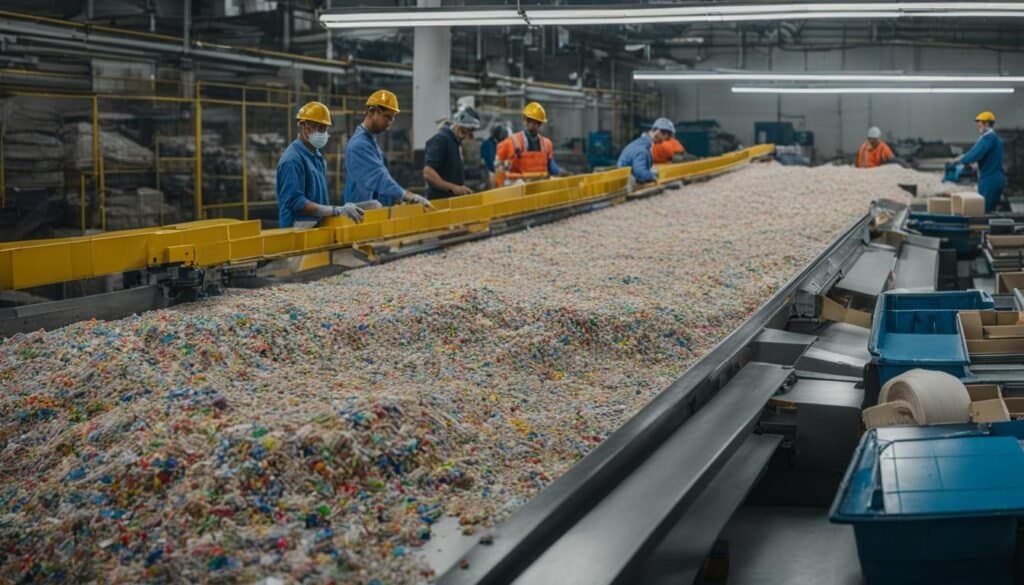
As the manufacturing world moves towards eco-friendly methods, recyclable materials play an essential role in shaping the industry’s future. Ranging from scrap metal to plastic waste, reusable resources promise a sustainable transformation of resource utilization.
From Scrap Metal to Plastic Waste: A Spectrum of Reusable Resources
The spectrum of recyclable materials impacting manufacturing processes covers metals, plastics, paper, and textiles. All of these can be repurposed into new products, while positively influencing production processes and waste management systems. By employing various recyclable items, manufacturers can reduce reliance on virgin raw materials, contribute to a circular economy, and alleviate environmental burdens.
- Metals: Recycling metals like aluminum, steel, and copper conserves resources and reduces pollution.
- Plastics: From bottles to bags, recycled plastics efficiently replace virgin materials, saving energy and limiting waste.
- Paper: Recycled paper finds new uses in packaging materials, stationery, and more, conserving trees and limiting landfill waste.
- Textiles: Turning old clothes and fabrics into new products prevents unnecessary waste and contributes to sustainable fashion.
Aluminum, Paper, and Plastic: A Closer Look at Commonly Recycled Inputs
Aluminum, paper, and plastics emerge as the most commonly recycled inputs in manufacturing circles, supporting the reuse revolution. These materials are pivotal to shaping sustainable manufacturing due to their high recyclability and widespread availability. They not only save natural resources but also reduce the overall waste stream, easing up landfill burdens.
| Material | Benefits | Common Uses |
|---|---|---|
| Aluminum | Highly recyclable, energy-efficient and corrosion-resistant | Automotive components, packaging, building materials, and appliances |
| Paper | Conserves trees, reduces landfill waste, and decreases pollution | Printing paper, packaging materials, and stationery |
| Plastic | Conserves resources, reduces carbon footprint, and lowers greenhouse gas emissions | Bottles, containers, packaging materials, and industrial products |
By incorporating these recycled materials into the manufacturing chain, manufacturers create stable demand for greener products, which ultimately helps create a more sustainable and eco-friendly industry.
Technological Advancements in Recycling for Manufacturing Efficiency
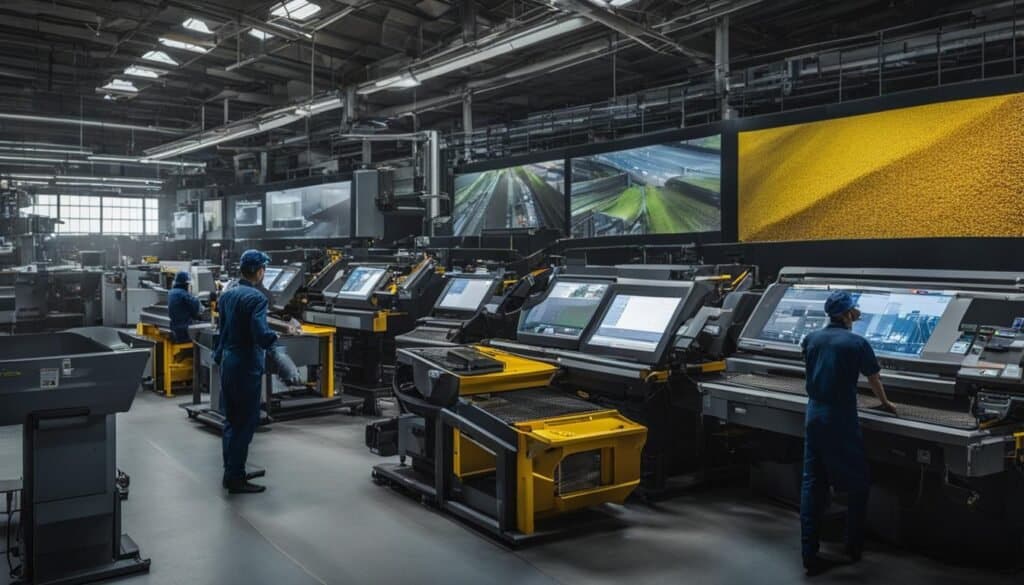
Technological advancements in the realm of recycling continue to revolutionize the manufacturing industry, enhancing efficiency and reducing the environmental impact. These innovations range from advanced energy management systems to water conservation solutions, empowering manufacturers to streamline operations and contribute to the global sustainability movement.
One of the hallmarks of this technology-driven transformation is the rise of solar power and smart manufacturing systems. By harnessing clean energy and employing intelligent tools and techniques, manufacturers are able to optimize resources and adopt more eco-friendly practices.
“Green technologies are enabling manufacturers to streamline processes, adopt smart energy distribution methods, and assist in the pursuit of converting waste to energy.”
Responsible waste management and recycling programs lie at the heart of sustainable production. These initiatives rely on a combination of technological ingenuity and conscientious planning to ensure minimal waste and resource consumption. Some key examples of technologies advancing recycling in manufacturing include:
- Advanced sorting and separation systems for recyclables.
- Machine learning algorithms to improve waste management efficiency.
- Robotics and automation for precise material handling and processing.
- Internet of Things (IoT) and blockchain for enhanced supply chain traceability and transparency.
These technological advancements are not only instrumental in driving efficiency within the manufacturing sector but also play a crucial role in realizing sustainable production targets. By leveraging these innovations, manufacturers can contribute to a profound shift in both industry and consumer mindset, heralding a new era of environmentally responsible and economically viable production.
Economic Advantages of Integrating Recycled Materials
Integrating recycled materials into manufacturing processes results in a multitude of economic benefits, from reduced production costs and energy use to competitive gains. This section will delve into the various ways recycling materials can create financial advantages for manufacturers.
Cost Savings and Competitive Gain: Analyzing the Financial Benefits
Cost savings are typically observed within manufacturing when recycled materials are introduced. By using such materials, businesses can decrease expenditures related to energy consumption, waste handling, and virgin raw material acquisition. Not only do recycled materials help to streamline operational expenses, but they also contribute to better resource utilization.
According to Environmental Leader, companies can save as much as 50% on production costs by implementing recycling practices into their manufacturing processes.
Recycling efforts have also proven to increase competitiveness within the market. Brands that invest in green practices and sustainable processes are better positioned to garner customer loyalty in an increasingly eco-conscious world. As consumer preferences shift towards eco-friendly products, businesses incorporating recycled materials into their production lines can experience improved sales and brand recognition.
- Statista reported that 75% of customers in the United States would be more likely to purchase products made from recycled materials.
- Nielsen’s 2015 Global Corporate Sustainability Report found that 66% of global consumers were willing to pay more for sustainable products.
| Economic Benefit | Description |
|---|---|
| Reduced Production Costs | Lower energy consumption and waste management expenses, minimized virgin materials acquisition costs |
| Increased Sales | Higher demand from eco-conscious consumers and subsequent earnings growth |
| Improved Brand Recognition | Elevated brand awareness and perception among environmentally engaged customers |
| Enhanced Supply Chain Collaboration | Opportunities to work with like-minded suppliers, fostering sustainability across the entire supply chain |
Ultimately, the adoption of recycled materials in manufacturing presents significant economic advantages. Businesses adopting these practices can expect to see a decrease in operational expenses and a shift in consumer favor, driving their brand towards a more competitive position within the market.
Case Studies: Success Stories of Sustainability in Manufacturing

Several companies have made substantial strides in incorporating recycled materials and sustainable practices into their manufacturing processes, resulting in remarkable transformations. Success stories abound, providing clear evidence of the benefits gained from embracing eco-friendly measures, including improved efficiency, customer loyalty, and adherence to environmental regulations.
Let’s delve into some real-life examples of companies that have achieved significant success through their commitment to sustainability and responsible manufacturing:
- Tesla, Inc.
- Patagonia
- Unilever
“Sustainability is not just about minimizing the environmental impact of our products and operations; it’s also about maximizing the environmental and social benefits of everything we do.”
— Elon Musk, CEO of Tesla, Inc.
Tesla, Inc. is a leading innovator in electric vehicle production, designing and developing a range of sustainable transportation solutions. Tesla prides itself on the use of recycled aluminum for manufacturing its car frames, contributing to a reduced carbon footprint compared to traditional vehicles built with virgin raw materials. In addition to implementing energy-efficient practices and sourcing renewable energy whenever possible, Tesla is actively involved in battery recycling programs to reduce its consumption of virgin materials and minimize waste.
Patagonia, an outdoor clothing and gear company, has long been a champion of sustainable manufacturing practices. Known for their commitment to environmental stewardship, Patagonia has achieved notable success by utilizing recycled polyester, organic cotton, and sustainably sourced materials in their products. Additionally, the company’s ongoing efforts to minimize waste and resource consumption throughout its supply chain have garnered tremendous customer loyalty and admiration.
Unilever, the multinational consumer goods manufacturer, is another shining example of embracing sustainability in manufacturing. The company’s ambitious Sustainable Living Plan focuses on three key areas: eradicating environmental impact, improving health and well-being, and enhancing livelihoods. In line with these commitments, Unilever has set specific targets for plastic reduction and material recycling, ensuring the use of sustainable materials in its packaging and products.
| Company | Industry | Recycled Materials | Key Sustainability Initiatives |
|---|---|---|---|
| Tesla, Inc. | Electric Vehicle Manufacturing | Recycled Aluminum | Battery Recycling, Energy-Efficient Practices, Renewable Energy |
| Patagonia | Outdoor Clothing and Gear | Recycled Polyester, Organic Cotton, Sustainable Materials | Waste Reduction, Environmentally Responsible Supply Chain |
| Unilever | Consumer Goods Manufacturing | Sustainable Packaging and Materials | Plastic Reduction targets, Material Recycling, Sustainable Living Plan |
In summary, these case studies showcase the remarkable achievements of organizations that have embraced sustainability in manufacturing. It is evident that the use of recycled materials and other eco-conscious approaches have yielded tangible returns, paving the way for even greater success in the future as more companies join the movement towards greener practices.
Challenges and Solutions in Using Recycled Materials in Production
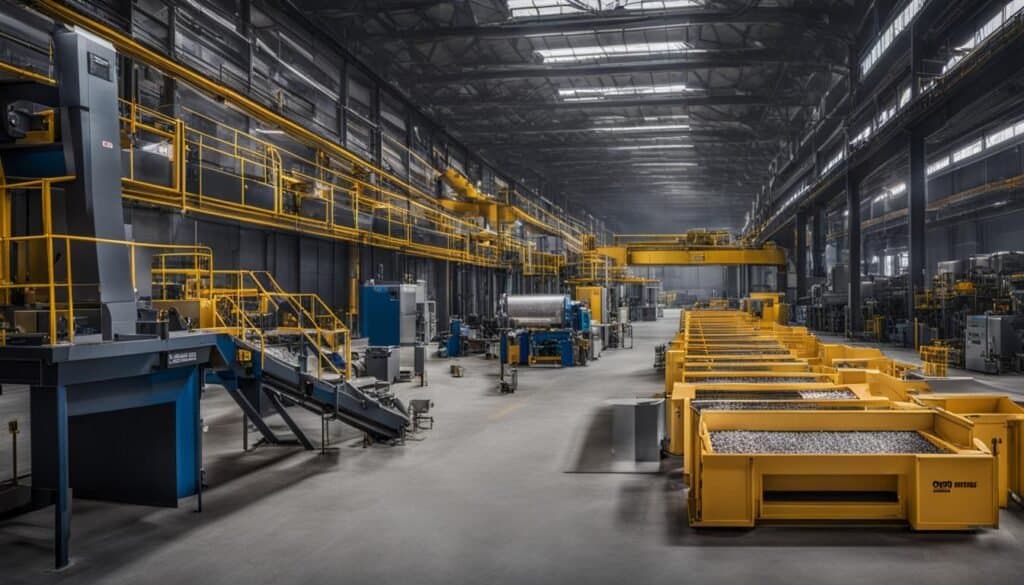
Manufacturers incorporating recycled materials into their production processes often face challenges in maintaining quality and managing their supply chains. To overcome these hurdles, strategic planning and innovative quality control measures become essential elements in integrating recycled materials efficiently and sustainably.
Overcoming Obstacles in Quality and Supply Chain Management
Quality control complications are among the foremost concerns when using recycled materials. Some recycled materials might not meet the standards required for specific products. Hence, businesses must invest in innovative quality control mechanisms to ensure that recycled materials adhere to the required specifications. Advanced sorting and processing technologies enable manufacturers to maintain consistent quality across their range of products and demonstrate their commitment to sustainable practices.
Supply chain management issues emerge as another challenge in utilizing recycled materials in production. Sourcing sustainable suppliers and efficiently processing materials requires industry-wide cooperation and commitment. To address these concerns, manufacturers can turn to key strategies, such as:
- Green chemistry: The creation of environmentally friendly chemical processes helps to reduce waste and energy consumption, contributing to a sustainable manufacturing ecosystem.
- Automation: Employing automated systems to optimize material handling and processing further supports efficiency and consistency in the production of goods made from recycled materials.
- Digitalization: Implementation of digital supply chain management tools enables companies to monitor suppliers’ sustainability practices, facilitating transparency and accountability throughout procurement processes.
- Collaborations with eco-conscious suppliers: Forming strategic partnerships with environmentally responsible suppliers aids in promoting a more sustainable manufacturing ethos across the entire industry.
Addressing quality concerns and supply chain intricacies is at the heart of a successful transition to using recycled materials in manufacturing processes. By adopting innovative measures, businesses can ensure the seamless integration of eco-friendly resources without compromising product quality, ultimately reinforcing a more sustainable and resilient manufacturing paradigm.
| Challenges | Solutions |
|---|---|
| Quality control | Invest in innovative quality control mechanisms, advanced sorting and processing technologies |
| Supply chain management | Green chemistry, automation, digitalization, collaborations with eco-conscious suppliers |
In conclusion, adopting recycled materials in production processes is an essential step toward sustainable and responsible manufacturing; however, it is not without its challenges. By addressing quality control and supply chain management concerns, manufacturers can confidently and efficiently integrate eco-friendly materials into their operations, ultimately contributing to a greener, more sustainable industrial landscape.
Engaging Stakeholders: Building a Culture of Sustainability

Engaging various stakeholders in cultivating a culture of sustainability is pivotal for the successful implementation of recycled materials usage. Education and awareness initiatives aimed at employees and consumers signify the necessity to apprise all parties of the environmental and economic merits of recycling.
General Kinematics suggests using technology and automation to effectively handle scrap and recover desirable materials, an essential aspect of recycling in manufacturing.
This educational impetus fosters a shared commitment towards eco-friendly manufacturing practices, creating a collective ethos of environmental responsibility within and beyond the corporate realm.
Educating Employees and Consumers on the Value of Recycled Materials
Effective education strategies encompass a broad range of initiatives, from providing training programs for employees to conducting workshops for consumers. These efforts not only boost awareness around the importance of recycling but also promote the adoption of sustainable practices.
- Training programs: Equip employees with recycling knowledge through workshops, e-learning modules, or on-the-job coaching.
- Recycling awareness campaigns: Use various communication channels, including newsletters, posters, and social media, to convey the benefits of using recycled materials in manufacturing.
- Community events: Participate in local events, such as Earth Day celebrations or recycling drives, to demonstrate the company’s commitment to sustainability.
- Consumer education: Offer workshops or webinars to consumers, helping them understand the benefits of purchasing products made from recycled materials.
Aligning Partnerships and Networks to Support Eco-Friendly Initiatives
The success of sustainable manufacturing practices hinges on aligning partnerships and networks that support eco-friendly initiatives. This alignment involves nurturing collaborations with suppliers, business partners, and other relevant stakeholders, creating a robust foundation to champion eco-conscious manufacturing.
| Partnership Type | Key Actions | Benefits |
|---|---|---|
| Sustainable Suppliers |
|
|
| Green Business Networks |
|
|
| Non-Governmental Organizations (NGOs) |
|
|
By engaging stakeholders, educating employees and consumers, and aligning partnerships and networks, businesses can cultivate a culture of sustainability that supports the effective incorporation of recycled materials into manufacturing processes. This collective commitment to eco-friendly practices reaps substantial environmental and economic benefits while ushering the industry towards a more sustainable future.
Conclusion on Recyclability
In the pursuit of efficient and sustainable manufacturing, the use of recycled materials has emerged as a significant force driving change. These materials not only provide environmental benefits, such as reduced carbon emissions and conserving natural resources, but also deliver tangible economic advantages in the form of cost savings and enhanced competitiveness.
Moving forward, it is essential to engage stakeholders and align partnerships in order to foster a culture that values sustainability and fosters innovation in manufacturing processes. Education and awareness initiatives are crucial for establishing a shared commitment to eco-friendly practices, laying the groundwork for industry-wide transformation.
Ultimately, sustainable manufacturing is not just an option, but an indispensable strategy for securing a greener future and a robust economy. By integrating recycled materials and adopting comprehensive green initiatives, manufacturers can contribute to a resilient industry capable of meeting the demands of an environmentally conscious consumer base.
FAQ on Recycled Materials Usage in Manufacturing
Q: What are the benefits of using recycled materials in manufacturing?
A: Using recycled materials in manufacturing helps reduce the amount of waste produced during manufacturing, conserves natural resources, and reduces the environmental impact of production processes.
Q: How can manufacturing companies incorporate recycled materials into their production process?
A: Manufacturing companies can incorporate recycled materials into their production process by using recovered materials from waste products, such as recycled plastic waste, recycled milk jugs, or waste-derived components and materials.
Q: What is the significance of recycled content in manufactured products?
A: Recycled content in manufactured products helps build a circular economy, reduces the demand for new raw materials, and promotes sustainability by repurposing waste materials for a new purpose.
Q: How can using recycled materials benefit consumer demand for sustainable products?
A: Using recycled materials can benefit consumer demand for sustainable products by providing eco-friendly options, such as green toys or products with recycled content, aligning with the growing preference for environmentally responsible choices.
Q: What challenges can manufacturing companies face when using recycled materials?
A: Manufacturing companies may face challenges such as ensuring a consistent supply of recycled materials, maintaining product quality, and redesigning products and industrial processes to adapt to the use of recycled materials.
Q: How do recycled materials contribute to creating a stable supply chain for manufacturing?
A: Recycled materials contribute to creating a stable supply chain for manufacturing by reducing dependency on finite resources, mitigating fluctuations in raw material availability, and fostering a more sustainable and resilient value chain.
Q: What role do recycled materials play in minimizing the environmental impact of industrial processes?
A: Recycled materials play a crucial role in minimizing the environmental impact of industrial processes by reducing energy consumption, decreasing emissions, and diverting waste from landfills, supporting a more sustainable and responsible approach to production.
Q: Can waste materials, such as plastic bottles, be effectively repurposed for manufacturing purposes?
A: Yes, waste materials such as plastic bottles can be effectively repurposed for manufacturing purposes, providing a valuable source of recycled material for various industries.
Q: How can manufacturing companies make new products from recycled materials?
A: Manufacturing companies can make new products from recycled materials by utilizing advanced recycling technologies, incorporating innovative design principles, and ensuring the quality and suitability of recycled materials for manufacturing purposes.
Q: In what ways can the use of recycled materials help reduce the environmental impact of end-of-life products?
A: The use of recycled materials can help reduce the environmental impact of end-of-life products by facilitating the transition to a circular economy, extending the lifespan of materials, and minimizing the generation of waste at the end of a product’s use.

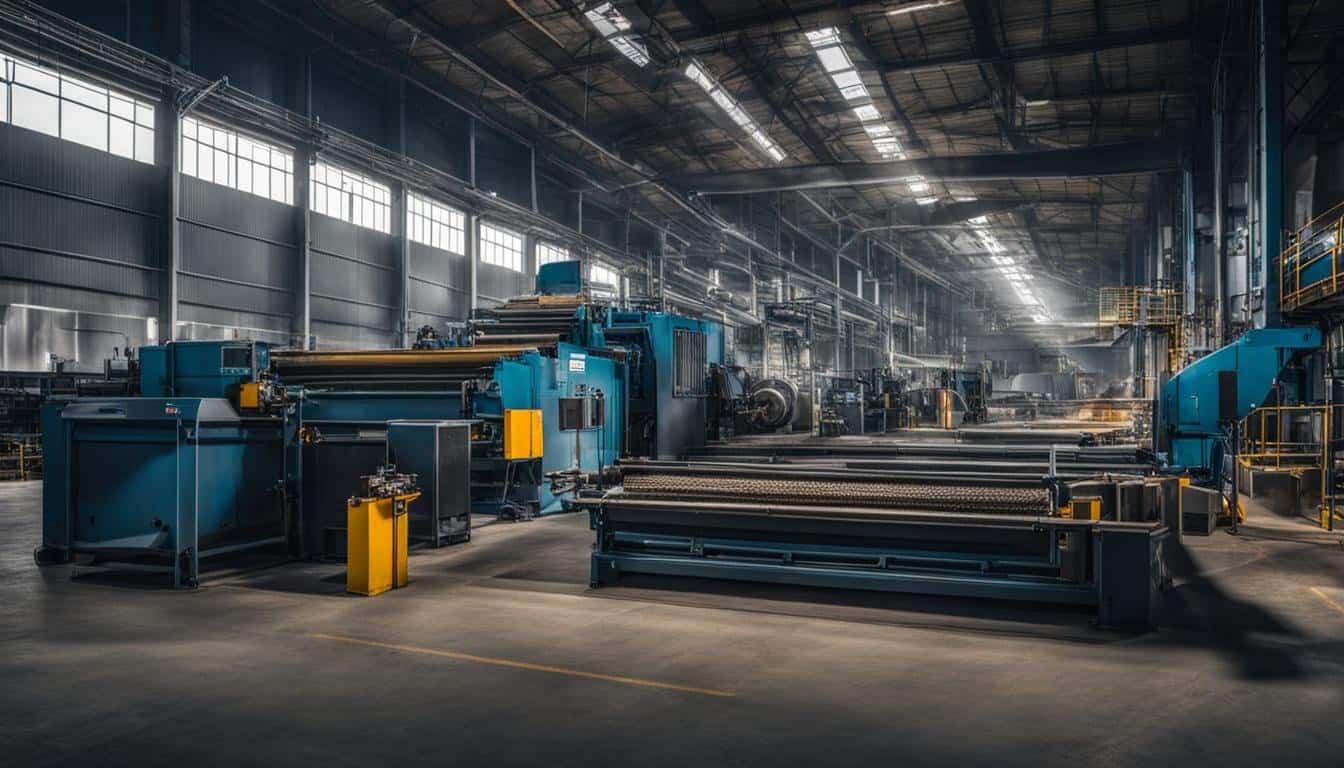


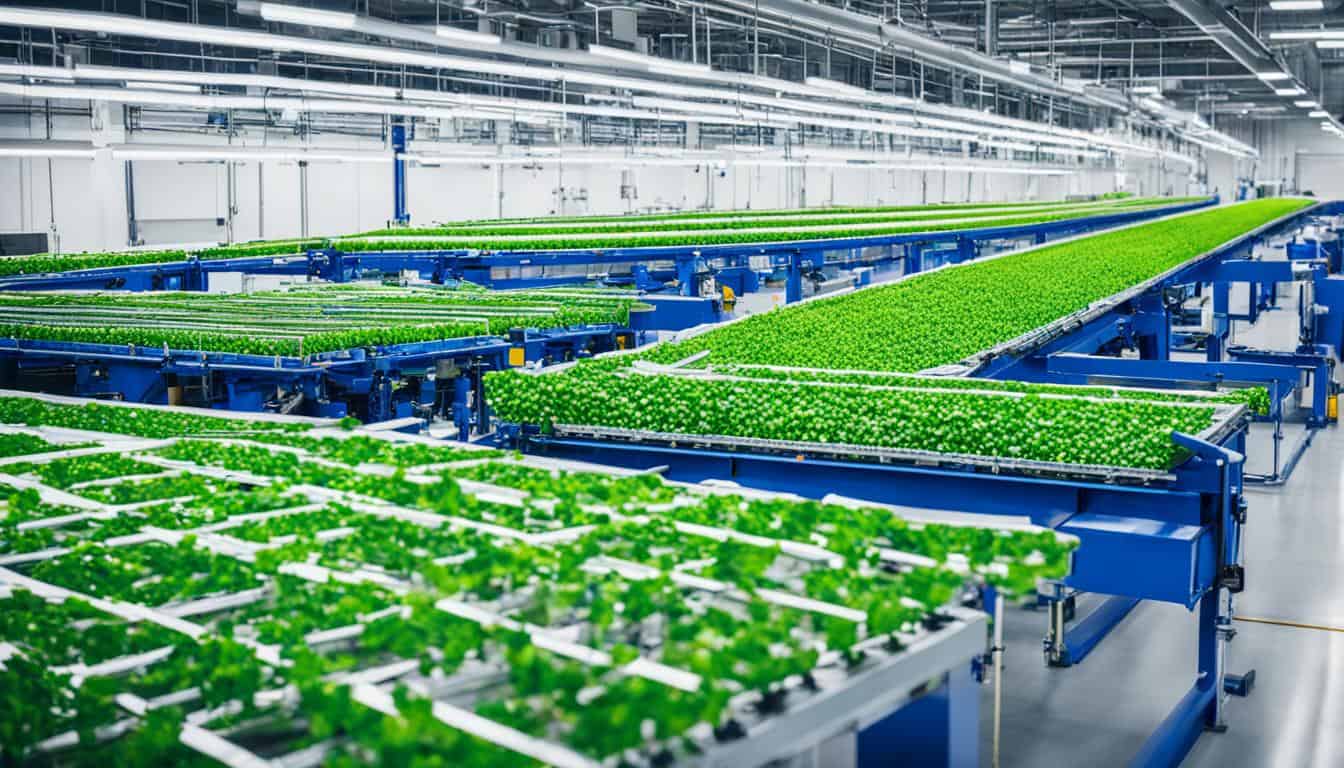
Leave a Reply